Editor’s Note: Rachel Laser’s appointment as Americans United’s new president and CEO was announced on Feb. 21, 2018. She succeeded the Rev. Barry W. Lynn, who led Americans United from 1992-2017. In this Q&A, Laser reflects on her first year and offers a vision for the future.
Q. You’ve been leading Americans United for a year now. Can you share some personal highlights from the past 12 months?
Laser: In my first months on the job, the Masterpiece Cakeshop and Muslim ban decisions came down, and by the summer, the nomination of Brett Kavanaugh to the Supreme Court was announced. These were dark moments, but I will never forget speaking on the steps of the U.S. Supreme Court alongside leaders from civil rights, religious minority, LGBTQ, Black Lives Matter, immigrant rights and so many other affected communities. In those moments, I felt proud to represent AU and to be insisting that our issue was front and center, motivated by how strongly receptive the diverse crowd was to our message and inspired by the tangible hope, raw power and fierce camaraderie in the air.
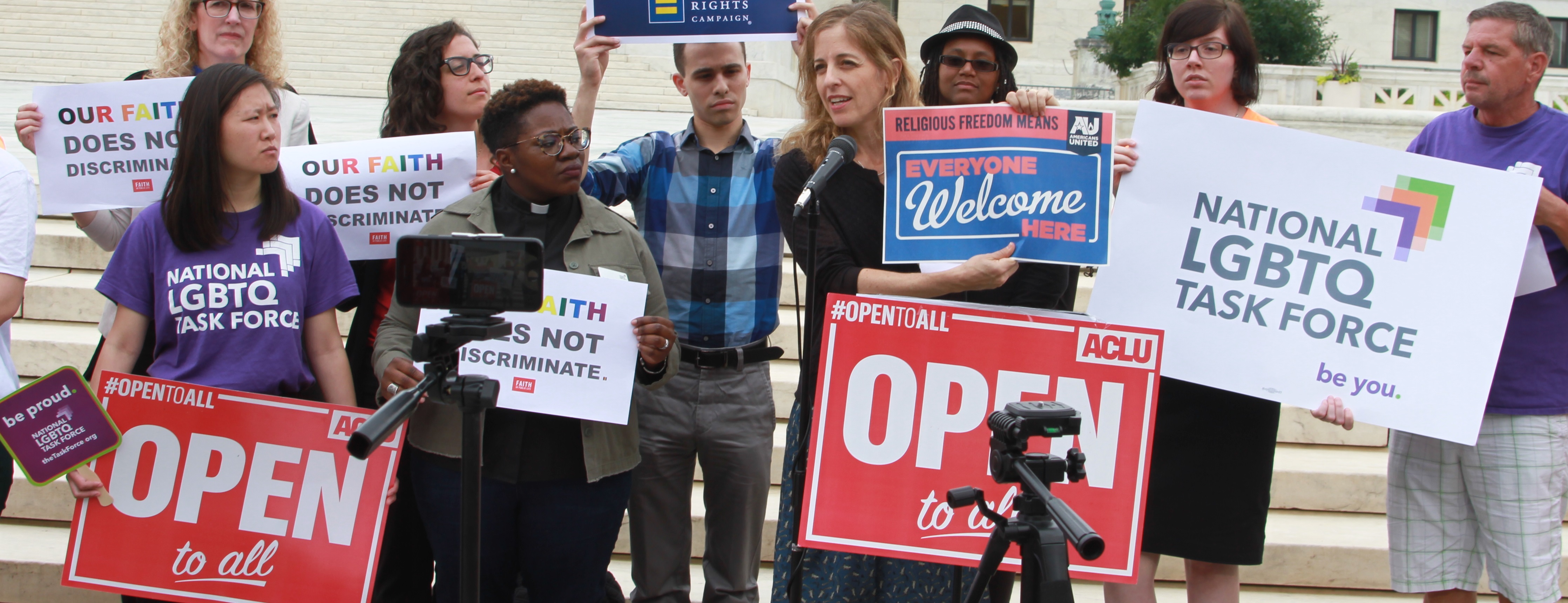 (PHOTO: AU President and CEO Rachel Laser speaks outside the U.S. Supreme Court after the opinion was issued in the Masterpiece Cakeshop case.)
(PHOTO: AU President and CEO Rachel Laser speaks outside the U.S. Supreme Court after the opinion was issued in the Masterpiece Cakeshop case.)
Q. You’ve been on the road and have addressed some AU chapters. What have you noticed about AU members?
Laser: I wrote a column about this called “My Favorite Group of Insubordinates,” (December 2018 Church & State) because, at some point in my travels, I saw with real clarity that one strong unifying theme among our members is that they all consider themselves to be defiant of, or at least resistant to, authority – and are proud of that characteristic! My sense is this stems at least in part from the fact that many of us consider ourselves different in certain ways from the “norm” or baseline and thus need to fight to be seen and accepted as equals.
Our members are also passionate, informed and indefatigable and have reliably been extremely welcoming to me as AU’s new leader!
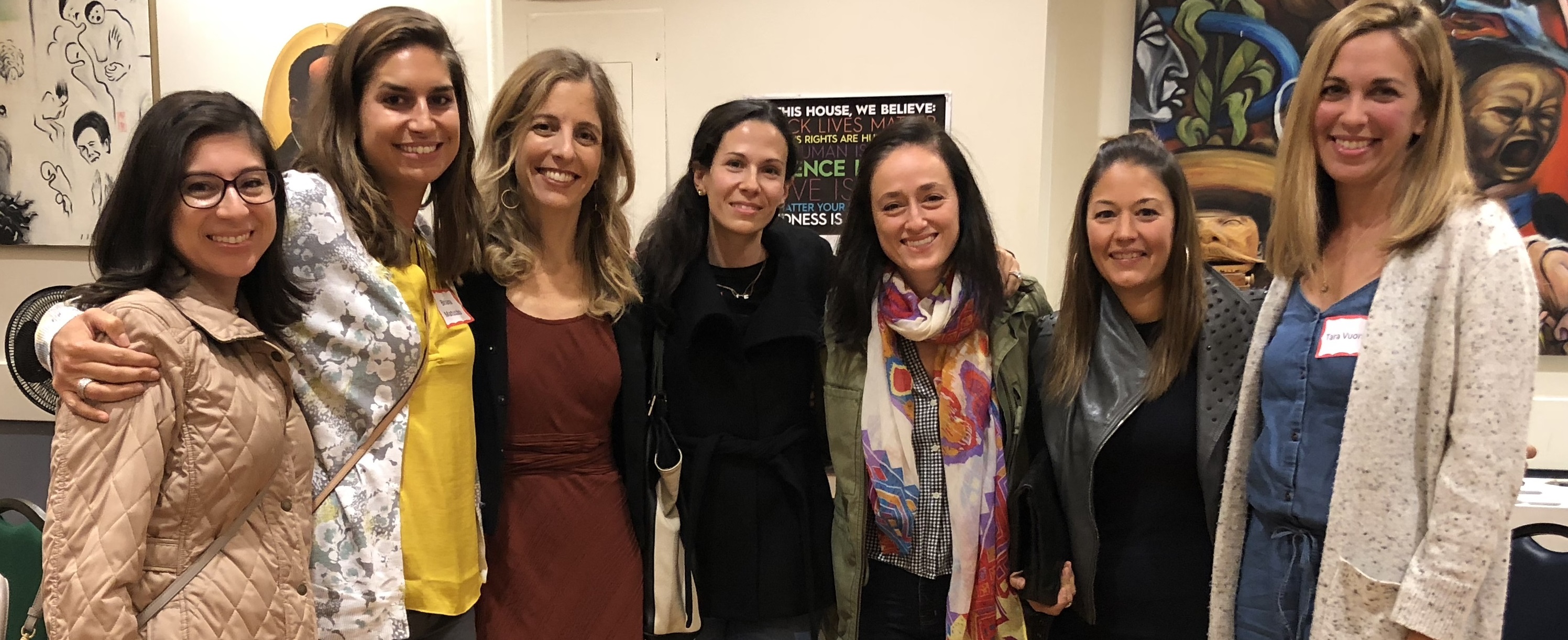
(PHOTO: AU President and CEO Rachel Laser meets with church-state separation advocates in Massachusetts.)
Q. We face some serious challenges as the Trump-Pence administration continues to undermine religious freedom and kowtow to the Religious Right and from Project Blitz. What gives you hope?
Laser: I feel hopeful when I see my entire staff willing to work late night after late night for months on end to fight the Kavanaugh nomination, despite the fact that the odds were against us. They knew our fundamental freedoms were at stake. I feel hopeful when AU hosts a meeting to fight Project Blitz, and the secular, faith, civil rights, LGBTQ, reproductive freedom and education groups all show up because we all have something serious to lose if we do not band together to fight Christian nationalism. I feel hopeful when AU presents our youth activist award to young adults like Kaylee Cole in Louisiana who was tired of being made to feel like she didn’t belong in her public school that encouraged the widespread promotion of Christianity to students and thus, with her family, sued the school district – and won.
I feel hope when AU’s hallways are bustling with the energy of a large class of summer interns, outspoken about church-state separation and bursting with great ideas about how best to connect to younger audiences. These young activists, including the hundreds of high school students who send us essays as part of our annual youth essay contest, demonstrate what we already know – that we can and must connect with the next generation of America’s leaders on the importance of church-state separation.
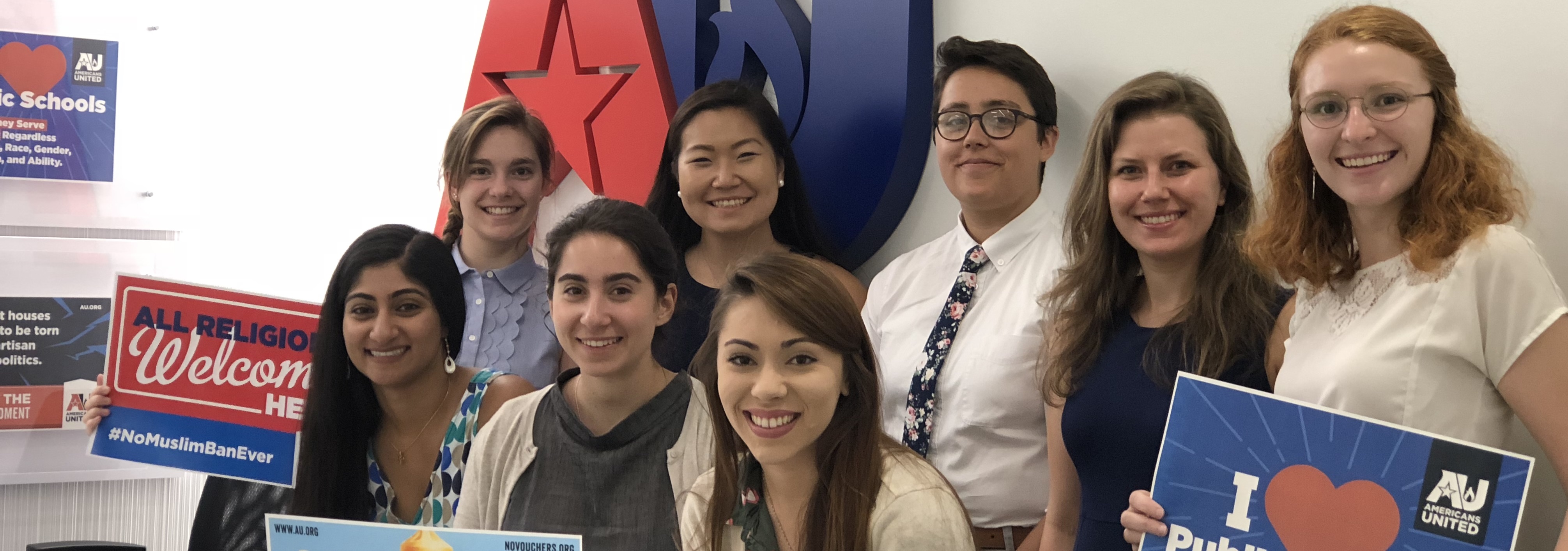
(PHOTO: Americans United interns show their support for church-state separation.)
Q. A new leader often brings a critical eye to an organization. Step into that role for a moment. Where do we need to improve?
Laser: AU’s Board of Trustees and senior staff have been working together since shortly after I started on developing a strategic roadmap for the next five years. We all agree that where we need to put the greatest emphasis right now is in growing our brand and visibility (both around AU and the issue of church-state separation) and bolstering our networks and advocacy in the states.
I also believe we need to do public opinion research so we have data to help us understand the challenges of selling our issue and what frameworks and messengers are most persuasive with different audiences. We must develop deep and lasting ties with communities of color, natural allies without whom AU will increasingly lack power in the generations to come. And we must do better at meeting young adults where they are and connecting the dots between their priority issues and church-state separation.
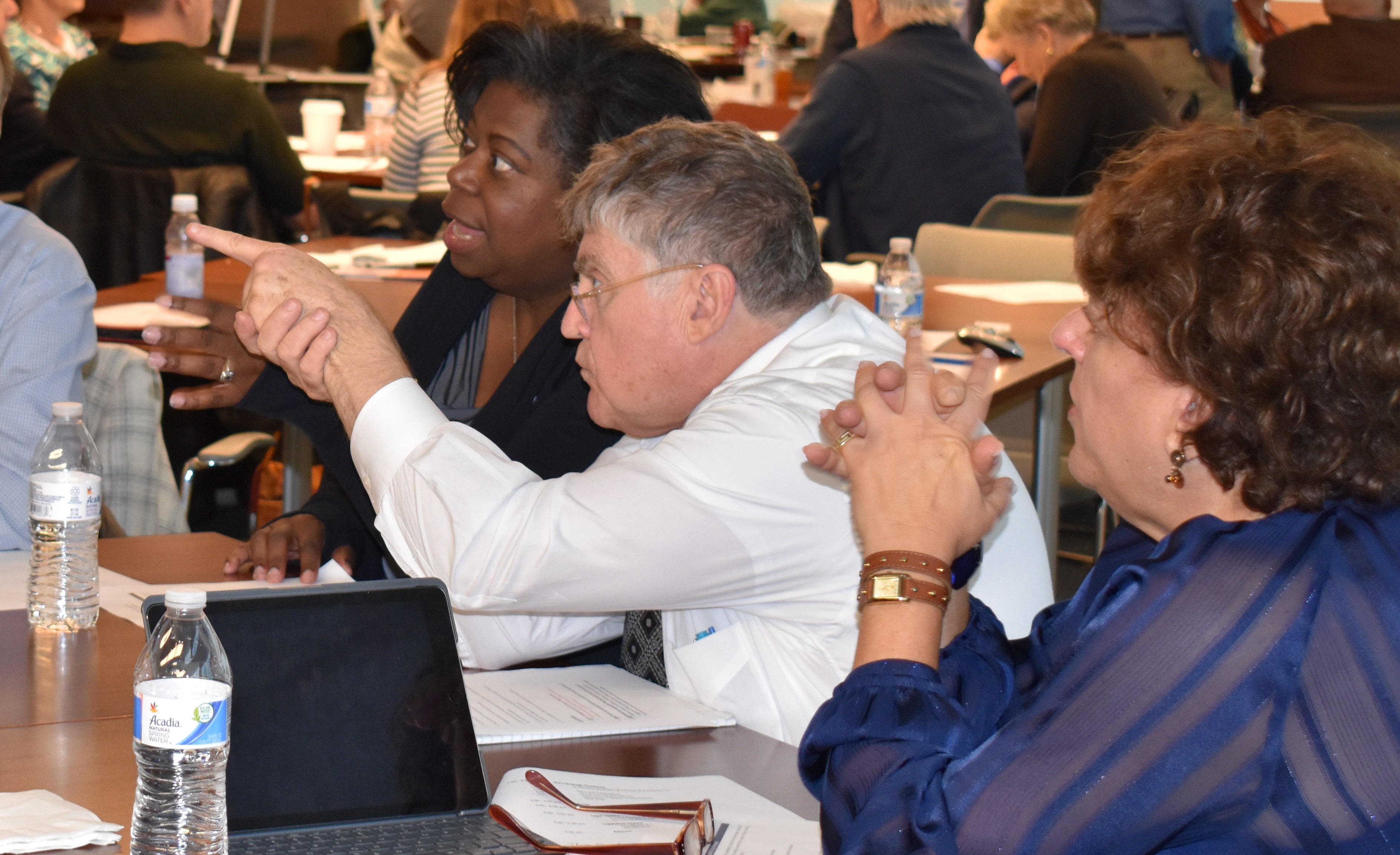
(PHOTO: AU board members and chapter leaders brainstorm ideas about AU’s future during the October 2018 Annual Meeting.)
Q. Let’s talk about some issues. During your tenure, we’ve seen an aggressive effort by the Religious Right to literally redefine religious freedom and turn it into an instrument that allows discrimination and harms against others. Why is this so dangerous?
Laser: It’s dangerous on a number of different levels. First, this misuse of the idea of “religious freedom” is aimed at causing real harm to real people, from denying patients vital and sometimes even lifesaving health care to preventing children from being placed in desperately needed loving foster and adoptive homes to assaulting people’s dignity by refusing them services.
Then there is the danger to religion itself. Younger people especially will increasingly associate religion predominantly with institutions that want to hurt others rather than help the most vulnerable, forge community and foster love for “the other.”
Last but not least, nothing short of the American experiment, itself, is at risk. Our country is predicated on the idea that people of any belief and no belief are equal here, and that the government will not choose one religion over another or religion over non-religion. Why? Because otherwise there would not be real freedom of conscience for all and, as the most diverse nation on earth, we would not be able to live together constructively and peacefully.
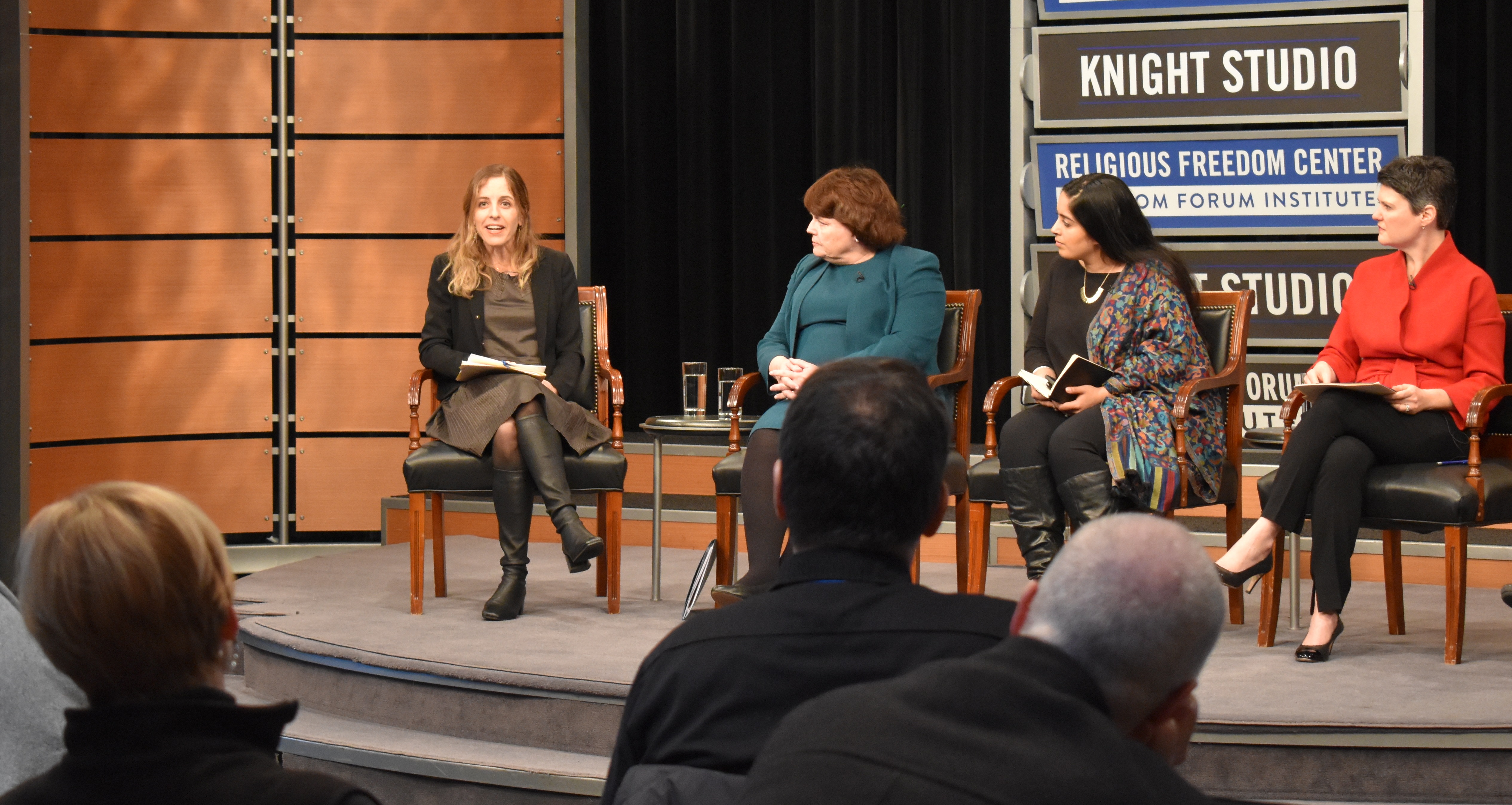
(PHOTO: AU President and CEO Rachel Laser talks about attempts to redefine and weaponize religious freedom during a panel discussion at the Newseum in December 2018.)
Q. As a member of a religious minority, you bring an interesting perspective to the question of the role of religion in public schools. Where do we draw the line between genuine student religious expression and school-sponsored worship?
Laser: I went to Lincoln Elementary, a public school in Chicago, until fifth grade. I remember a lot of things about it—the spelling bees, the card catalog system, my best friend being sick and having to make it through the day without her. But I never once remember being made to feel uncomfortable because I was among the few Jewish kids in my class. That’s because, at Lincoln, no teacher ever made the students pray or write lines out of the Bible (Hebrew or New Testament), there was no banner reading “In God We Trust” that was on display and just generally, religion was not a school-sponsored activity.
At the same time, I remember asking for and proudly wearing my first Star of David necklace when I was at Lincoln and also have a vivid memory of a classmate explaining that she did not celebrate Halloween because she was a Jehovah’s Witness. Rather than making me uncomfortable, hearing about other kids’ different religious beliefs made me feel even more comfortable having my own. Genuine student religious expression that is in no way school-supported promotes an atmosphere of true religious freedom, whereas school-sponsored worship offends religious freedom for all and makes kids like me, from religious minorities, feel vulnerable and like they don’t belong.
Q. We’ve seen some erosion at the Supreme Court on the issue of taxpayer funding of religion. Let’s get back to basics: Why is it a problem for the government to try to “help” religion with financial assistance?
Laser: If the government “helps” religion with financial assistance, it is impossible for the government not to violate the First Amendment’s religion clauses and favor one religion over another, let alone religion over non-religion. Taxpayer-funded religion is an assault on the essence of a nation defined by the government’s commitment not to sponsor religion. And it hurts religion. What happens when religion becomes dependent on the government for funding over private donations, and then the government takes that money away? Also, there could be strings attached, either explicit or implicit, to government funding that could infuse religion with impure government-mandated practices or commitments. While government funding for religion might seem like a short-term gain for some, it’s ultimately a losing proposition for all.
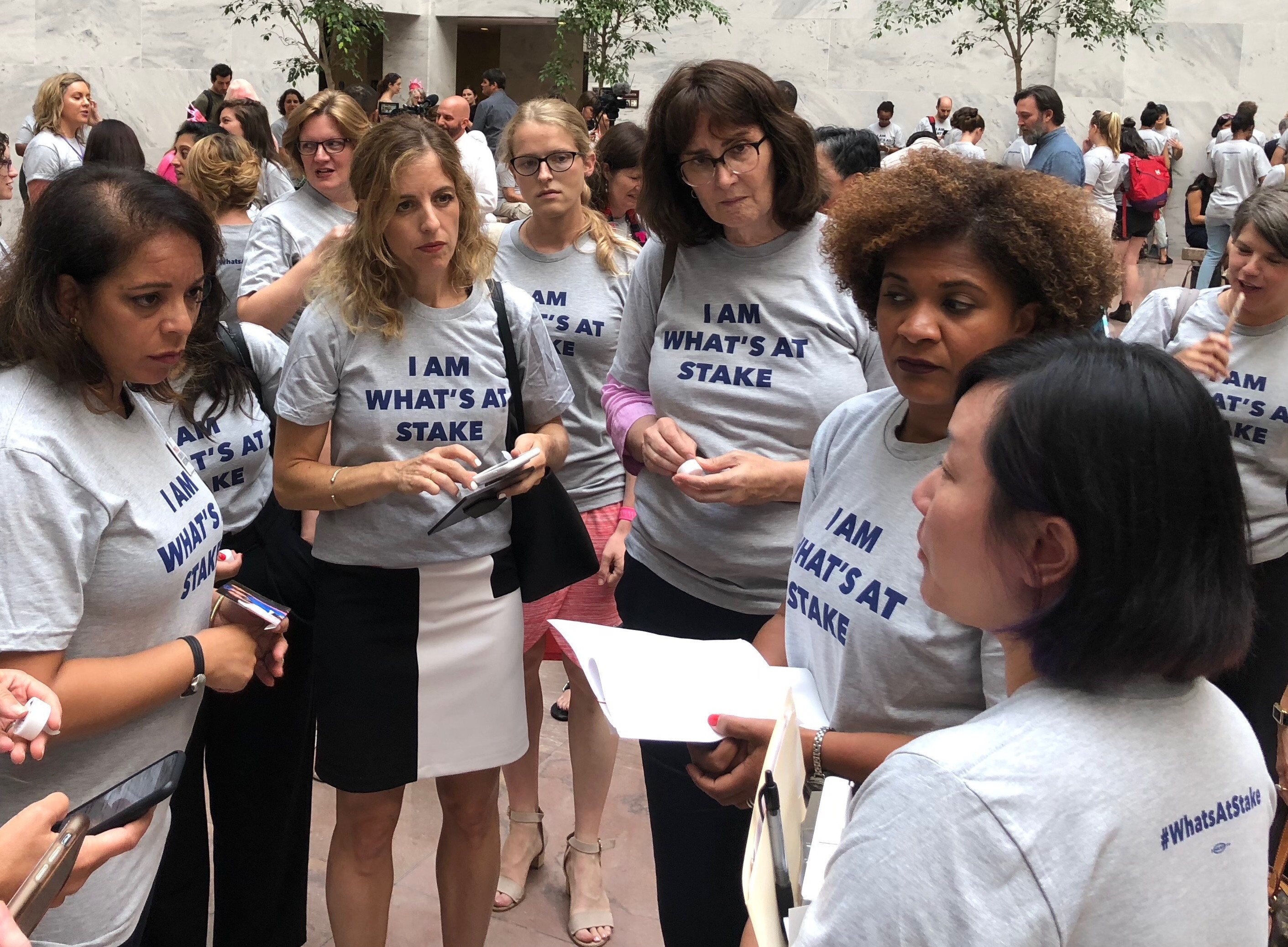 (PHOTO: AU President and CEO Rachel Laser meets with allies to protest the nomination of Brett Kavanaugh to the U.S. Supreme Court.)
(PHOTO: AU President and CEO Rachel Laser meets with allies to protest the nomination of Brett Kavanaugh to the U.S. Supreme Court.)
Q. AU has been working to explain the nexus between church-state separation and issues like LGBTQ rights, reproductive rights, etc. Why is this important and where do you see AU’s place as we connect these dots?
Laser: Our country has an undeniably long and egregious track record of using religion as a basis for stopping positive social change. Over the course of our history, our government has used religion to justify policies ranging from slavery to anti-miscegenation laws to preventing women’s access to birth control and full equality in the workplace.
Unfortunately, today more than ever, the Trump-Pence administration, together with the Religious Right, is once again misusing the idea of “religious freedom” to advance their regressive social agenda. Their aim is to turn back the clock on recent strides toward equality in the LGBTQ community, and also to undercut longer-established women’s rights, such as access to birth control and abortion.
AU must lead the fight against this behavior, because it is unconstitutional and undermines true religious freedom – and because it is twisting one of our most sacred principles into an instrument of harm. If we can succeed in connecting the dots between issues like LGBTQ equality and reproductive freedom and church-state separation, we will win over the next generation of America’s leaders and also exponentially grow our movement.
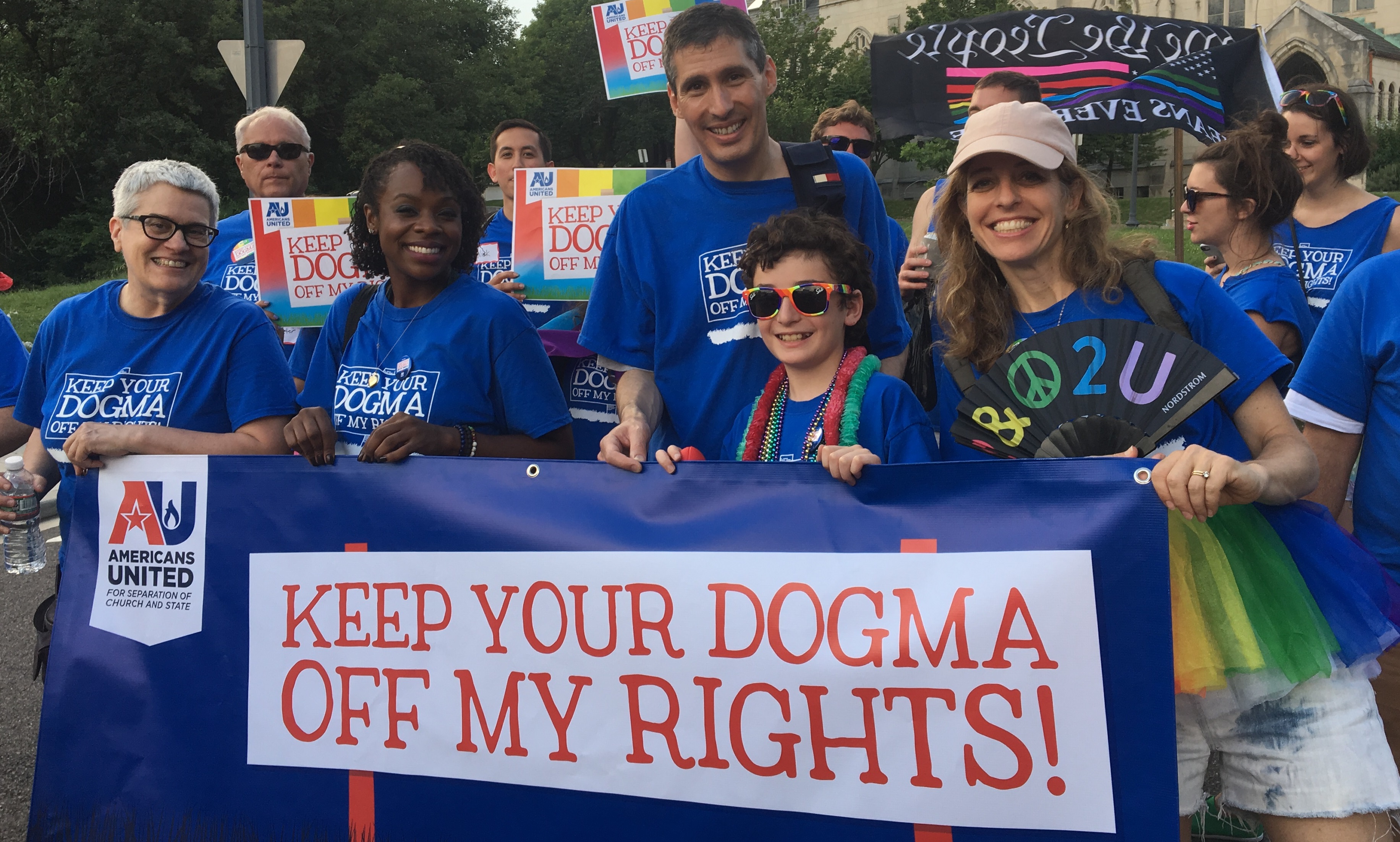
(PHOTO: AU staff members and supporters march in the 2018 Capital Pride Parade in Washington, D.C.)
Q. What are your plans for 2019?
Laser: To meditate! And to finish building the right AU leadership team and drafting our five-year strategic roadmap so that we can begin to set up AU for success as we continue into the 21st century. I hope this next year will also include some in-depth public opinion research. Part of the challenge will be keeping my eyes on the stars, but my feet on the ground. My husband’s boss once said that everyone always overestimates what they can get done in one year but underestimates what they can get done in five! Still, I’m not afraid to dream big, and I invite all of Americans United’s loyal supporters to go there with me.
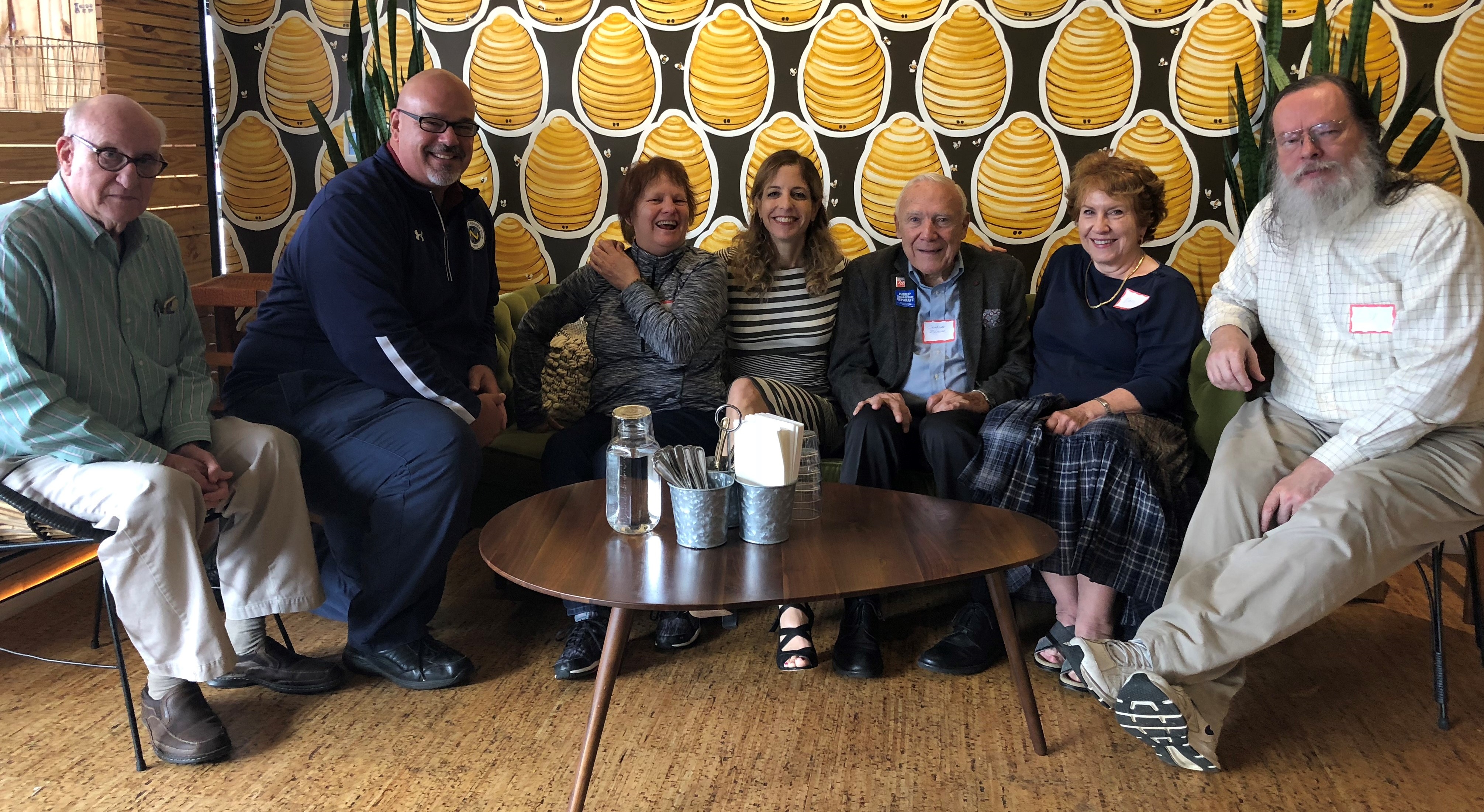
(PHOTO: AU President and CEO Rachel Laser meets with AU members, supporters and faith leaders in Nashville, Tenn.)


